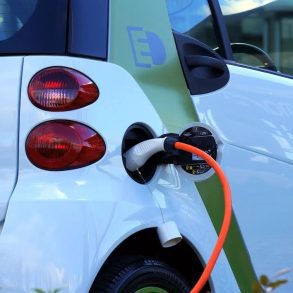 Last Wednesday, the European car industry has proven to be firmly in control in the Brussels government. The European Parliament voted for the decision of October 28th, which allows diesel cars until 2020 to emit more than twice as much nitrogen oxides than has been stipulated in a law from 2007, and fifty percent more after 2020. A veto against this decision has not made it through the parliament as a result of strong lobbying by the automobile manufacturers. In return for not having to meet the emissions requirements, a new fuel efficiency test will be implemented from September 1st 2016, in which cars will no longer be tested in a lab (on a dyno) but on the road instead, which should lead to more realistic fuel economy test results. This test is logically called the Real Driving Emissions test (RDE). However, the lobby of the manufacturers has also succeeded in getting some elements of this test toned down or even deleted.
Last Wednesday, the European car industry has proven to be firmly in control in the Brussels government. The European Parliament voted for the decision of October 28th, which allows diesel cars until 2020 to emit more than twice as much nitrogen oxides than has been stipulated in a law from 2007, and fifty percent more after 2020. A veto against this decision has not made it through the parliament as a result of strong lobbying by the automobile manufacturers. In return for not having to meet the emissions requirements, a new fuel efficiency test will be implemented from September 1st 2016, in which cars will no longer be tested in a lab (on a dyno) but on the road instead, which should lead to more realistic fuel economy test results. This test is logically called the Real Driving Emissions test (RDE). However, the lobby of the manufacturers has also succeeded in getting some elements of this test toned down or even deleted.
Read this interesting article about how the car manufacturers were able to dictate the European Commission which amendments to make to its proposal for the RDE and how most of their input got accepted. The very imperative tone of the e-mail Volkswagen has sent on behalf of the ACEA, the alliance of European Car Manufacturers to the EC in 2014 perfectly illustrates who’s in control in this relationship.
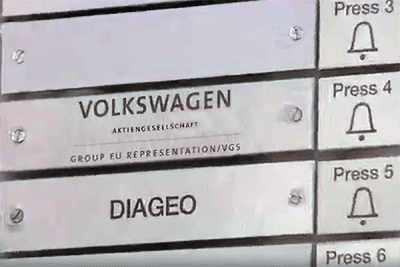 If you wonder how it’s possible that the industry is able to bend the rules to their advantage, take a look at these figures: 240 lobbyists operate in Brussel on behalf of the automotive industry, which have an annual budget of 18,2 million Euros. Volkswagen is one of the most powerful companies, the EU transparency Register shows that the VW Group employs 43 lobbyists (18 fte) with an annual budget of 3,3 million Euros. It has to be noted that they are by no means the only ones, the banking sector has a much larger budget for lobbying. In total, about 30.000 lobbyists are at work in Brussels, for both sides of the negotiating table, so including those who work for environmental support groups and other stakeholders.
If you wonder how it’s possible that the industry is able to bend the rules to their advantage, take a look at these figures: 240 lobbyists operate in Brussel on behalf of the automotive industry, which have an annual budget of 18,2 million Euros. Volkswagen is one of the most powerful companies, the EU transparency Register shows that the VW Group employs 43 lobbyists (18 fte) with an annual budget of 3,3 million Euros. It has to be noted that they are by no means the only ones, the banking sector has a much larger budget for lobbying. In total, about 30.000 lobbyists are at work in Brussels, for both sides of the negotiating table, so including those who work for environmental support groups and other stakeholders.
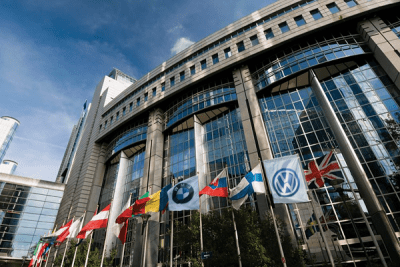 Among others, this lobby made sure that it has taken almost 10 years to turn the proposal of fuel economy testing on the road instead of in a lab to actual legislation. And when European regulators wanted to tighten the CO2 emissions standards in 2013, Daimler and BMW enlisted the help of Angela Merkel to make sure this was taken off the table. For years, the automotive industry has enjoyed a climate in which they were able to dictate the regulators in Brussels by playing the employment card: the automotive industry employs more than 12 million people in the EU and is worth about 4% of its GDP. With that in mind, it’s actually quite understandable that politicians are easily pushed over when threatened with job losses of such magnitude.
Among others, this lobby made sure that it has taken almost 10 years to turn the proposal of fuel economy testing on the road instead of in a lab to actual legislation. And when European regulators wanted to tighten the CO2 emissions standards in 2013, Daimler and BMW enlisted the help of Angela Merkel to make sure this was taken off the table. For years, the automotive industry has enjoyed a climate in which they were able to dictate the regulators in Brussels by playing the employment card: the automotive industry employs more than 12 million people in the EU and is worth about 4% of its GDP. With that in mind, it’s actually quite understandable that politicians are easily pushed over when threatened with job losses of such magnitude.
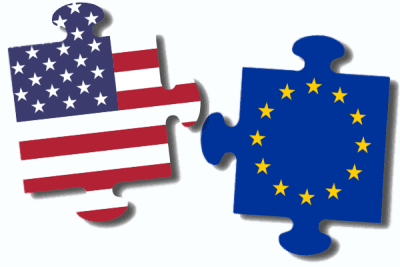 This will only get worse after the Transatlantic Trade and Investment Partnership (TTIP) is signed between Europe and the US, as this will affect the relationship between lobbyists and politicians because of the so-called Investor-State Dispute Settlement (ISDS) procedure, which gives multinational corporations the right to sue a government if it is negatively impacted by a policy change which adversely amends former agreements (for example made by an earlier parliament). In other words, it will become ever more difficult to impose stricter requirements on an industry. For example, if the industry is convinced that the RDE test is introduced too quickly, causing some of its models currently in production to be labeled as non-conforming, which means production lines need to be closed down, they will threaten politicians with the prospect of lost jobs. Within this new treaty they could also sue the EU government for the financial damages they incur from these closures, in effect making them even more powerful against the parliament.
This will only get worse after the Transatlantic Trade and Investment Partnership (TTIP) is signed between Europe and the US, as this will affect the relationship between lobbyists and politicians because of the so-called Investor-State Dispute Settlement (ISDS) procedure, which gives multinational corporations the right to sue a government if it is negatively impacted by a policy change which adversely amends former agreements (for example made by an earlier parliament). In other words, it will become ever more difficult to impose stricter requirements on an industry. For example, if the industry is convinced that the RDE test is introduced too quickly, causing some of its models currently in production to be labeled as non-conforming, which means production lines need to be closed down, they will threaten politicians with the prospect of lost jobs. Within this new treaty they could also sue the EU government for the financial damages they incur from these closures, in effect making them even more powerful against the parliament.
 However, I believe this would lead to a loss of competitiveness for the European automotive industry. If car buyers around world would know that European manufacturers are being held to the highest standards in emissions (and in safety for that matter), it would benefit the image of the entire industry as technologically superior to others who are not challenged as hard. This is a similar line of thought as the automakers themselves use when lobbying against the implementation of a speed limit on the still unlimited parts of the world famous German Autobahns: they claim that part of the image of superior German engineering is due to them having to make their cars suitable to drive as fast as 250 km/h and therefore are of superior quality, comfort and handling to cars which are built for places where they’ll never exceed 130 km/h.
However, I believe this would lead to a loss of competitiveness for the European automotive industry. If car buyers around world would know that European manufacturers are being held to the highest standards in emissions (and in safety for that matter), it would benefit the image of the entire industry as technologically superior to others who are not challenged as hard. This is a similar line of thought as the automakers themselves use when lobbying against the implementation of a speed limit on the still unlimited parts of the world famous German Autobahns: they claim that part of the image of superior German engineering is due to them having to make their cars suitable to drive as fast as 250 km/h and therefore are of superior quality, comfort and handling to cars which are built for places where they’ll never exceed 130 km/h.
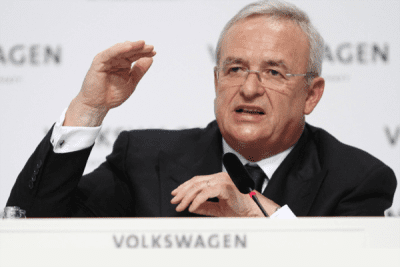 I know that it’s not possible to just snap a finger and suddenly have much cleaner and fuel efficient cars, but the industry has repeatedly proven that their focus lies elsewhere if there’s no political pressure to work on these criteria, using arguments like “the consumer is not willing to pay extra for clean technology”. However, when the law challenges them to meet stricter regulations, somehow they always manage to come up with solutions. The fact that Volkswagen turned to fraud to meet the extremely strict emissions requirements of the US government is only a testimony of a rotten corporate culture and doesn’t disprove this theory, as other manufacturers like BMW and Daimler have developed exhaust treatment systems to meet the requirements.
I know that it’s not possible to just snap a finger and suddenly have much cleaner and fuel efficient cars, but the industry has repeatedly proven that their focus lies elsewhere if there’s no political pressure to work on these criteria, using arguments like “the consumer is not willing to pay extra for clean technology”. However, when the law challenges them to meet stricter regulations, somehow they always manage to come up with solutions. The fact that Volkswagen turned to fraud to meet the extremely strict emissions requirements of the US government is only a testimony of a rotten corporate culture and doesn’t disprove this theory, as other manufacturers like BMW and Daimler have developed exhaust treatment systems to meet the requirements.
A lobby is and will remain a necessary evil in the process of legislation. A policymaker will often seek the expertise of the relevant industry and other stakeholders to arrive at a sound decision. As long as there remains a balance between both sides of the negotiating table, there should be no interference with the process of lawmaking. However, the automotive industry appears to have tilted the balance a little too far to their own advantage, helped by the local governments who are dependent on the jobs in their countries. Ultimately, this risks harming not only the health of the European citizens, but also their own reputation as they are being outclassed by the competition from elsewhere.
 For example, Toyota has an image of being one of the “greenest” manufacturers because it was the first to successfully market a hybrid car, if hydrogen mobility ever takes off, Hyundai will have the claim of being the first to have sold a non-prototype fuel cell vehicle. These technological breakthroughs are independent of government stimulation because the companies realized the marketing potential of being technologically advanced and environmentally friendly. Similarly, Volvo is taking the safety of its occupants and other road users so much further than government regulations demands of them at the moment, that it has become one of their Unique Selling Points.
For example, Toyota has an image of being one of the “greenest” manufacturers because it was the first to successfully market a hybrid car, if hydrogen mobility ever takes off, Hyundai will have the claim of being the first to have sold a non-prototype fuel cell vehicle. These technological breakthroughs are independent of government stimulation because the companies realized the marketing potential of being technologically advanced and environmentally friendly. Similarly, Volvo is taking the safety of its occupants and other road users so much further than government regulations demands of them at the moment, that it has become one of their Unique Selling Points.
So instead of trying to tone down a fuel economy test and lobbying to be allowed to keep producing vehicles with harmful emissions, the auto industry should embrace these strict regulations and get to work on meeting or exceeding them. As a result, European automotive industry, including the suppliers, will become known around the world for being the most innovative and clean industry in the world. And policymakers should realize that using input from an industry that it should govern is acceptable as long as it remains no more than using the industry’s expertise. However, they should realize they risk facing public disgrace and a loss of credibility as soon as they give an industry too much influence in their policies.


